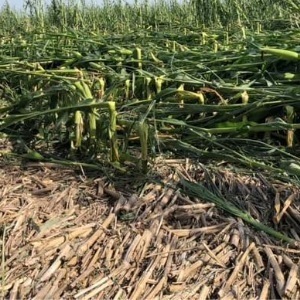USGC: Overall US corn supply to remain strong

SOURCE: U.S. Grains Council
August 28, 2020
BY U.S. Grains Council
As the world has seen through photos such as these, a powerful, 14-hour derecho hit more than 700 miles of crop land in the U.S. Midwest – mainly in Iowa, Illinois, Nebraska and Ohio – on Aug. 10.
While damage to farms and corn crops in the storm’s path is still being quantified, estimates show up to 8.2 million acres of corn and 5.2 million acres of soybeans have been impacted in Iowa alone, along with tens of millions of bushels of grain storage, machinery storage, homes and other businesses.
While this event is tragic and historically significant, the resiliency of the American farm sector cannot be underestimated. Even with the regional damage from the storm, other areas of the U.S. Corn Belt are still expecting an above-average corn harvest this fall. In addition, the United States maintains more than a 2-billion-bushel carryout of corn, further reinforcing that U.S. corn supplies will remain available for customers around the world.
Advertisement
The leaders and members of the U.S. Grains Council stand ready to support those affected by the derecho in the United States and overseas customers watching the U.S. corn crop’s development this season. Our hearts go out to those reeling from this unexpected weather event.
Advertisement
Related Stories
Metro Ports on April 8 announced significant environmental milestone in its voluntary efforts to reduce greenhouse gas emissions. By switching to renewable diesel, the organization reduced its carbon emissions by 85%.
CoBank latest quarterly research report highlights current challenges facing the biobased diesel industry. The report cites policy uncertainty and trade disruptions due to tariff disputes as factors impacting biofuel producers.
The U.S. EIA on April 15 released its Annual Energy Outlook 2025, which includes energy trend projections through 2050. The U.S. DOE, however, is cautioning that the forecasts do not reflect the Trump administration’s energy policy changes.
The USDA on April 14 announced the cancellation of its Partnerships for Climate-Smart Commodities program. Select projects that meet certain requirements may continue under a new Advancing Markets for Producers initiative.
The Michigan Advanced Biofuels Coalition and Green Marine are partnering to accelerating adoption of sustainable biofuels to improve air quality and reduce GHG emissions in Michigan and across the Great Lakes and St. Lawrence Seaway.
Upcoming Events










